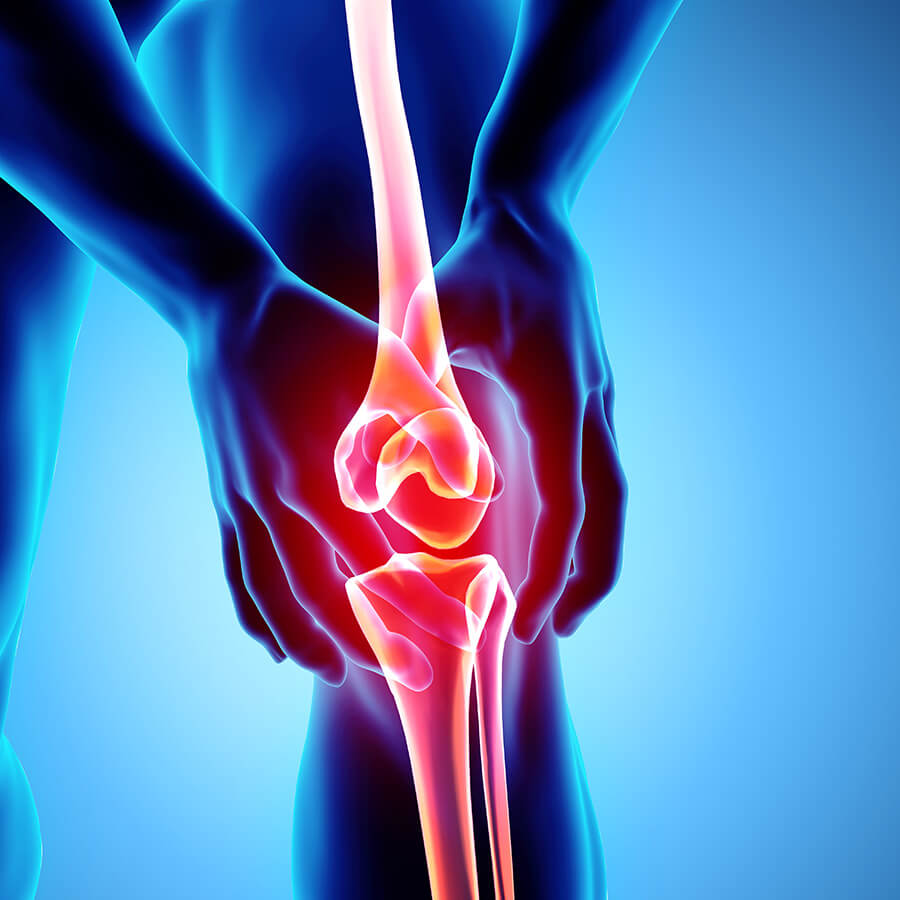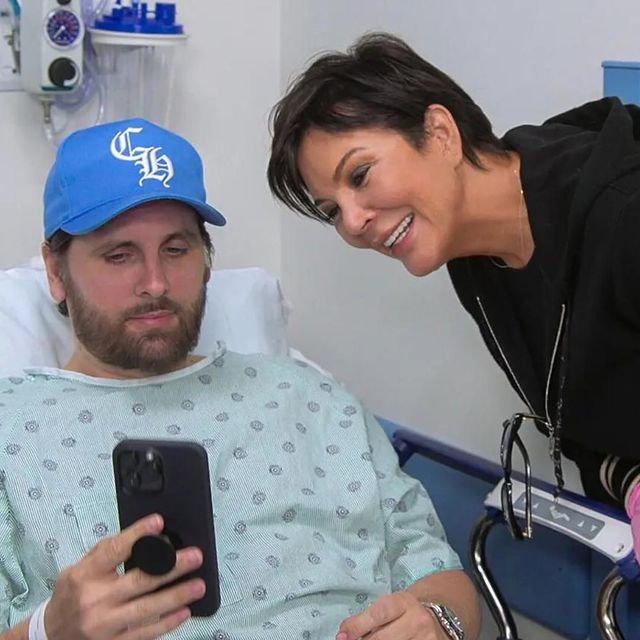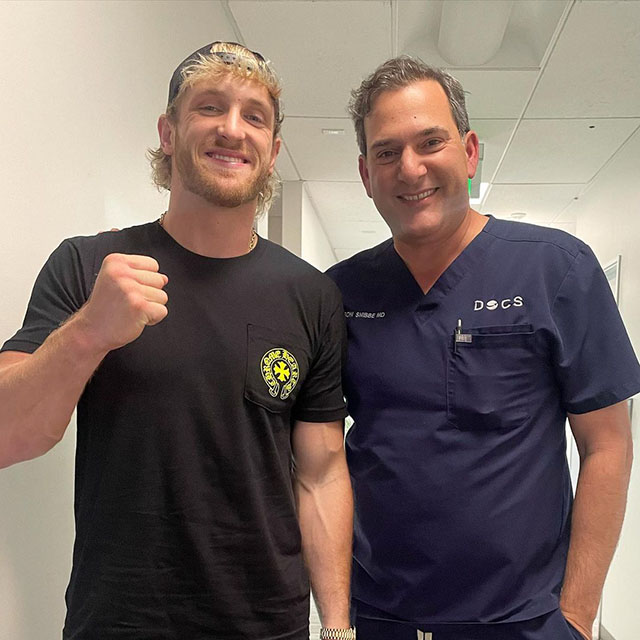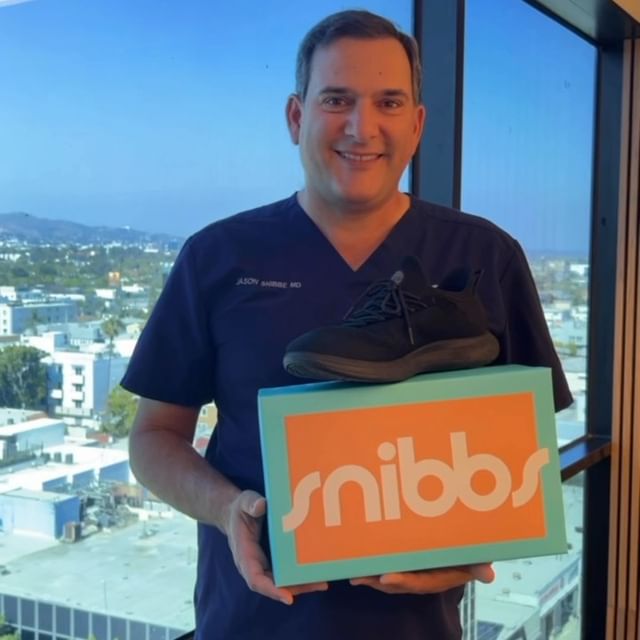Revision Total Knee Arthroplasty
in Los Angeles, CA
Revision total knee arthroplasty (TKA), or knee replacement surgery, is a surgical procedure to address complications or failures associated with a previous knee replacement.
It’s essential to understand when and why revision TKA may be necessary. Complications from the initial knee replacement, such as implant wear, infection, or instability, can lead to pain, reduced function, and a diminished quality of life. Revision TKA is a specialized procedure designed to address these issues and restore optimal joint function.
Knee Implant Revision
The primary objective is often to replace worn or malfunctioning knee implant components. Advancements in implant design and materials may provide improved durability and functionality.
Treatment for Infection
In cases of infection, thorough debridement (cleaning) and antibiotic treatment are crucial.
Staged revision surgeries may be required to address infection effectively.
Correction of Knee Replacement Alignment Issues
Correcting misalignment or instability through bone grafting or other corrective procedures is vital to ensure proper joint mechanics.
Snibbe Orthopedics in Los Angeles, California, offers knee replacement surgery to restore function and relieve pain with advanced surgical techniques and compassionate care.
Are You a Candidate for Revision Knee Replacement?

The following conditions and symptoms may indicate that you are a good candidate for revision total knee arthroplasty:
- Persistent pain or discomfort: Individuals experiencing persistent or worsening pain in the knee following a previous knee replacement may be candidates for revision TKA.
- Decreased mobility: Limited range of motion, instability, or difficulty with daily activities may indicate the need for revision surgery.
- Complications from previous surgery: In cases of implant wear, infection, or other complications from the initial knee replacement, revision TKA may be considered.
- Scar tissue: Occasionally, overgrowth of scar tissue surrounding a total knee arthroplasty can create pain, disability, and limitation of range of motion. Sometimes an arthroscopic debridement of the scar tissue can improve function, range of motion, and alleviate pain. This is a simple outpatient procedure that involves using arthroscopic instruments through tiny keyhole incisions to remove the tissue.
Dr. Snibbe Orthopedics provides treatment for a wide range of conditions. Call our office at (310) 860-3048 to schedule a revision total knee arthroplasty consultation in Los Angeles, California.
Benefits of Revision Total Knee Arthroplasty
Some of the benefits revision total knee arthroplasty can provide include:
- Improved function: Revision TKA aims to restore joint function and mobility.
- Enhanced durability: Advances in surgical techniques and implant materials contribute to increased longevity and durability of the revised knee joint.
Relief of knee pain: Addressing complications stemming from the initial knee replacement typically results in significant pain relief.
How Is Revision Total Knee Arthroplasty Performed?
Preoperative Planning
Your knee replacement journey begins with an in-depth consultation, during which Dr. Snibbe will listen to your concerns, assess your symptoms, and examine the problematic knee replacement. He will explain your options and answer any questions you have.
Imaging studies and personalized planning for the revision procedure are also conducted.
Anesthesia
Revision TKA is typically performed under general anesthesia, although regional anesthesia may also be an option.
Surgical Approach
Dr. Snibbe uses the existing incision or creates a new one to access the knee joint. He then removes the existing implant, corrects bone defects, places the new implant, and closes the incision.
Recovery from Revision Total Knee Arthroplasty
Immediate Postoperative Care
After the surgery, you will be closely monitored for early mobilization and the appropriate pain management protocol. At your first follow-up appointment, Dr. Snibbe will evaluate the quality of your healing and further assess your knee function.
Physical Therapy, Weight-Bearing, and Mobility
Early initiation of physical therapy is crucial for regaining strength, flexibility, and functional mobility. Gradual progression to weight-bearing activities and walking with assistance is facilitated to promote joint recovery.
Follow all instructions provided by Dr. Snibbe and your physical therapist to achieve ideal results.
What Results Can I Expect After Revision Total Knee Arthroplasty?
- Pain reduction or elimination: You can expect to experience a significant reduction in discomfort after the revision procedure.
- Improved mobility: Restoration of joint function and stability contributes to improved mobility and range of motion.
- Enhanced quality of life: Successful revision TKA can improve quality of life, allowing you to engage in daily activities more easily.
How Much Does Revision Total Knee Replacement Cost?
The cost of revision total knee replacement is based on the extent of correction needed, as well as fees for anesthesia and the surgical center. You will receive an inclusive cost estimate following your consultation.
Your Los Angeles Revision Total Knee Arthroplasty Experts
Revision total knee arthroplasty is a specialized procedure designed to address complications and failures associated with a previous knee replacement. The advancements in surgical techniques and implant materials Dr. Snibbe incorporates in revision total knee replacement help our patients regain mobility, alleviate pain, improve their overall quality of life, and enjoy enhanced longevity of their results.
If you feel you could benefit from a revision knee replacement in Los Angeles, Hollywood, or the San Fernando Valley, call our office at (310) 860-3048 to schedule your consultation. Patients traveling to the Los Angeles area for expert orthopedic care are also welcome.
Our skilled and experienced orthopedic surgeon will perform a thorough assessment and create a personalized treatment plan tailored to your needs.
Revision Total Knee Arthroplasty FAQ (Frequently Asked Questions)
Is revision total knee arthroplasty more complicated than the initial knee replacement?
Yes, revision TKA is generally considered more complex due to existing scar tissue, bone loss, and the need to address complications from the initial surgery.
How long is the recovery period after revision TKA?
Recovery timelines vary, but patients can typically expect several weeks to months of rehabilitation and physical therapy.
Are there risks associated with revision total knee replacement?
As with any surgery, there are risks, including infection, blood clots, and anesthesia-related complications. However, the benefits of addressing complications almost always outweigh the risks.
Can all complications from the initial knee replacement be addressed through revision TKA?
While most complications of initial knee replacement surgery can be corrected, the feasibility depends on the specific nature of the problem and the patient’s overall health.
Will I need to undergo revision surgery if I experience pain after knee replacement?
Not all pain after knee replacement necessitates revision. Conservative treatments may be explored first, and surgery is considered when these options are not effective.
Can a revision TKA be performed using minimally invasive techniques?
In some cases, minimally invasive techniques may be employed; however, the complexity of revision surgery may require a more traditional approach.
Will the recovery after revision TKA be more challenging than after the initial surgery?
Recovery may be more challenging due to existing scar tissue and potential bone loss. However, diligent rehabilitation efforts can yield positive outcomes.
Is there an age limit for undergoing revision total knee arthroplasty?
Age alone is not a determining factor. The decision is based on the individual’s overall health, the severity of complications, and the potential benefits of revision surgery.
Can both knees undergo revision TKA simultaneously?
Simultaneous bilateral revision TKA is generally not recommended due to increased postoperative challenges. Staged procedures are often preferred.
How long can I expect the revision total knee arthroplasty results to last?
The longevity of results varies, but advancements in implant design and surgical techniques contribute to improved durability. The goal is to provide long-term relief and functionality.

If you have knee pain or reduced function, please call us at (310) 860-3048 to schedule your consultation with Dr. Snibbe.






